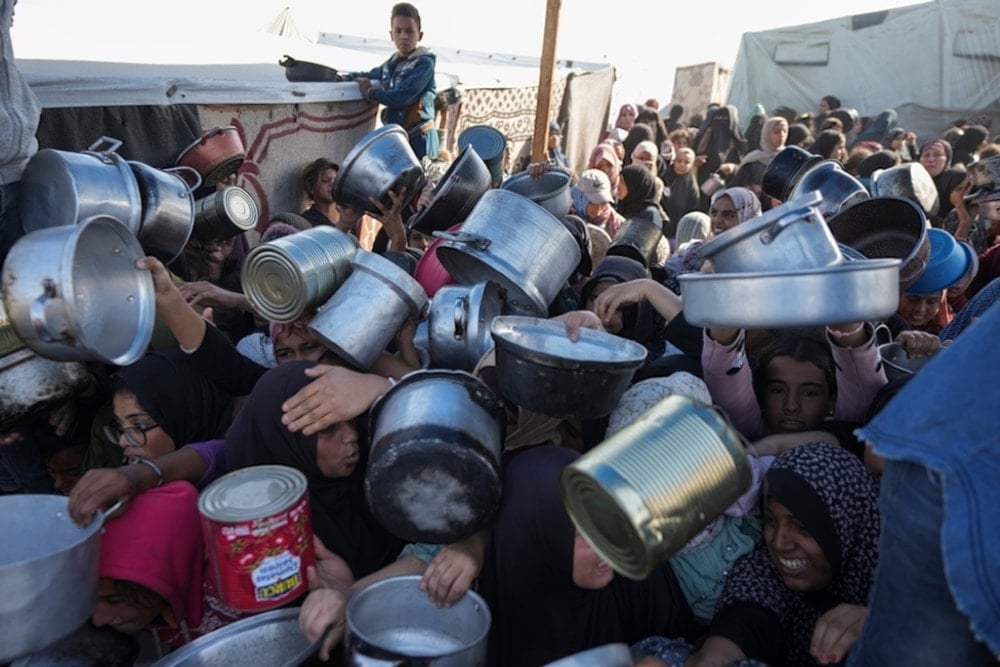Germany, France, UK say 'Israel's' Gaza blockade 'must end'
Ministers from Germany, France, and the UK criticize the Israeli "Minister of Defense" for 'politicizing humanitarian aid' and call on "Israel" to stop the blockade to allow humanitarian aid into the Gaza Strip.
-
 Palestinian women and girls struggle to reach for food at a distribution center in Khan Younis, Gaza Strip, Friday, December 6, 2024 (AP)
Palestinian women and girls struggle to reach for food at a distribution center in Khan Younis, Gaza Strip, Friday, December 6, 2024 (AP)
Germany, France and Britain warned "Israel" of "an acute risk of starvation, epidemic disease and death" on Wednesday, urging "Israel" to cease its illegal blockade of the strip that has led a severe food shortage and a healthcare crisis that has caused hundreds of Palestinian deaths over the last fifteen months.
"This must end," their foreign ministers said in a joint statement. "We urge Israel to immediately restart a rapid and unimpeded flow of humanitarian aid to Gaza in order to meet the needs of all civilians."
The United Nations takes a similar view, warning of a dire humanitarian situation for the 2.4 million Palestinians in the Gaza Strip, after 18 months of devastating war, and an Israeli blockade on aid since March 2.
"Israel", on the other hand, without providing any evidence to sustain its claims, has accused the Resistance group, Hamas, of diverting aid, which the latter denies.
The situation in #Gaza is worsening by the day.
— UNICEF MENA - يونيسف الشرق الأوسط وشمال إفريقيا (@UNICEFmena) April 7, 2025
No aid has entered since 2 March 2025.
Water is running out. Healthcare is collapsing.
Children and families are paying the price.
The ceasefire must be reinstated. Humanitarian aid must be allowed in — now. pic.twitter.com/RpLV6l7dx6
"The Israeli decision to block aid from entering Gaza is intolerable," the three ministers said Wednesday.
"Humanitarian aid must never be used as a political tool and Palestinian territory must not be reduced nor subjected to any demographic change," they said.
They also criticised Israeli security minister, Israel Katz, for "recent comments politicising humanitarian aid" and described Israeli plans to remain in Gaza after the war as "unacceptable".
Politicizing humanitarian aid, Katz stated that the blockade is "one of the main pressure levers preventing Hamas from using (aid) as a tool with the population."
"Israel must do much more to protect the civilian population, infrastructure, and humanitarian workers," they said.
Famine, healthcare crisis in the Gaza Strip
In Gaza, famine is not just a risk, but is likely rapidly unfolding in almost all parts of the strip, warned the heads of twelve major aid organizations in the strip, according to Agence France-Presse (AFP).
In a statement made just one week after "Israel's" March 2 blockade resumed, Hamas spokesperson Hazem Qassem labeled Israeli closure of border crossings as a blatant violation of the ceasefire agreement, which stipulates the unrestricted flow of humanitarian aid. He warned that a very real threat of famine is unfolding in the Gaza Strip.
Hamas further condemned Israeli actions as Human Rights violations in practicing collective punishment against the entire civilian population of Gaza, and violations of the Geneva Conventions.
The foreign ministers also expressed "outrage at recent strikes by Israeli forces on humanitarian personnel, infrastructure, premises, and healthcare facilities" in Gaza.
"Israel" has a well-recorded history of targeting aid entering the Gaza Strip.
“How much longer until hollow words of condemnation will translate into action to lift the siege, resume a ceasefire and save whatever is left of humanity?
— UNRWA (@UNRWA) April 22, 2025
It’s been 50 days of siege on #Gaza imposed by the Israeli authorities.
Hunger is spreading and deepening, deliberate and… pic.twitter.com/DDuxgJmBku
Last February, the Director-General of the Ministry of Health in Gaza, Munir al-Barsh, stated that essential supplies needed to operate hospitals, such as fuel and oxygen stations, have not reached northern Gaza.
Al-Barsh added that around 40% of kidney failure patients have died due to a lack of dialysis machines, emphasizing the urgent need for field hospitals, as many medical centers in the north have ceased operations.
Gaza’s Government Media Office accused the Israeli occupation of deliberately delaying the implementation of a humanitarian protocol, evading its commitments where the Israeli occupation was expected to allow the entry of 60,000 caravans, 200,000 tents, and 600 aid trucks daily into the besieged enclave.
At the time, the office urged international guarantors to take action and pressure "Israel" to comply with the humanitarian protocol to prevent further deterioration of the crisis in Gaza.

 4 Min Read
4 Min Read








